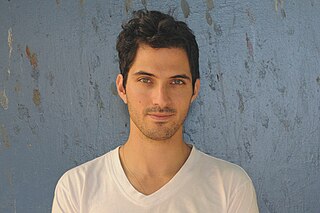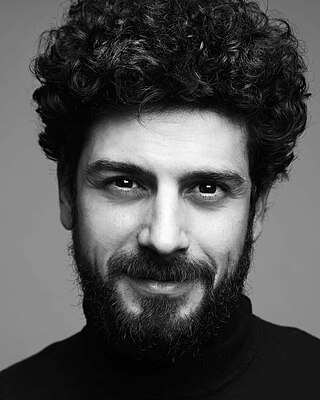
Ramat HaSharon is an affluent city located on Israel's central coastal strip in the south of the Sharon region, bordering the cities of Tel Aviv to the south, Hod-HaSharon to the east, and Herzliya and kibbutz Glil Yam to the north. It is part of the Tel Aviv District, within the Gush Dan metropolitan area. In 2022 Ramat HaSharon had a population of 48,181m and its citizens are nearly entirely Jewish.

Beer in Israel is manufactured primarily by two major breweries – Tempo Beer Industries and Israel Beer Breweries. Over the past decade numerous microbreweries have established themselves throughout the country. Beer festivals are held annually in Israel, of which one of the largest is in Jerusalem.

Renen Schorr is a film director, screenwriter, film producer and Israeli film activist. In 1989, he founded Israel's first independent, national school for film and television, the Sam Spiegel Film and Television School – Jerusalem, and has served as its director since that time. During the last 40 years he founded or co-founded the infrastructure of Israeli film funds and cinematheques. In December 2016 he was awarded the Chevalier des arts et lettres by the French government.

Joshua Simon, is a curator, writer, publisher, cultural critic, poet, filmmaker and public intellectual. He currently lives in Philadelphia.

Cinema of Israel refers to film production in Israel since its founding in 1948. Most Israeli films are produced in Hebrew, but there are productions in other languages such as Arabic and English. Israel has been nominated for more Academy Awards for Best Foreign Language Film than any other country in the Middle East.

The Loners is a 2009 Israeli drama film directed by Renen Schorr starring Sasha Avshalom Agrounov and Anton Ostrovsky.

Dan Wolman is an Israeli filmmaker and lecturer in film studies.

Ran Danker is an Israeli–American actor, singer and model. He starred in hit Israeli series such as HaShir Shelanu (2004–2007), The Gordin Cell (2012–2015), Miguel (2018) and more. Danker received an Ophir Award nomination for Best Supporting Actor for his role in Eyes Wide Open (2009). Danker was also nominated for an Ophir Award for Best Actor for his role in Doubtful (2017).

Avi Nesher is an Israeli film producer, film director, screenwriter and actor.

Anat Atzmon is an Israeli actress and singer.

The Band, הלהקה, is a 1978 Israeli musical comedy film directed by Avi Nesher about a military band during the War of Attrition. The story dives into the hazing, intense rivalries, and romantic entanglements between veteran members and new recruits who are eager to prove themselves. The movie was initially unsuccessful but has grown in popularity over time. The character of the choir leader is inspired by the real-life composer, arranger, and music director of The Nahal Band, Yair Rosenblum.

Zero Motivation is a 2014 Israeli black comedy film directed by Talya Lavie. The film premiered at the 2014 Tribeca Film Festival where it received two awards. It was nominated for twelve Ophir Awards, and won six of them including prizes for writer/director Talya Lavie. It was the most successful Israeli film of 2014, seen by 590,000 people in Israel alone.
Micky Rabinovitz is an Israeli film producer and company owner of "Light Stream Israel".

Noam Meiri is an Israeli theater artist, actor, director and acting teacher. Meiri is a co-founder of the Tel Aviv Haguf Theater School and Stage for Physical theatre, inspired by the method of Jacques Lecoq. Since 1999 he has served as a professor of Physical Theater at Folkwang University of the Arts in Essen, Germany.

Ruth Schloss was an Israeli painter and illustrator. Major themes in her work were Arabs, transition camps, children and women at eye-level. She expressed an egalitarian, socialist view via realism in her painting and drawing.

Avraham Aviv Alush is an Israeli actor, musician, model, and television host. He is best known for playing Amos Dahari "The Baker" in the Israeli series Beauty and the Baker, and as Jesus in the American film The Shack (2017). He also played a leading role in the Israeli series Valley of Tears (2020).

Uzi Peres was an Israeli film director, screenwriter and film producer.

Maya Kenig is an Israeli film director, writer and actress. She is best known for her work on The Milky Way (2023), In the Shade of the Palm Tree (2018), The Bentwich Syndrome (2015), Off White Lies (2011) and Top of the World (2005). Her films were awarded in many festivals worldwide. As an editor, she is known for On the Spectrum, Uri and Ella, Up the Wrong Tree and Connected.
Michal Vinik is an Israeli filmmaker, director and screenwriter. She teaches filmmaking at Tel Aviv University and Beit Berl College.

Yadin Gellman is an Israeli film, television and stage actor and model. He was the first celebrity Israeli victim of the October 7 attack, sustaining serious injuries amid the Be'eri massacre.

















